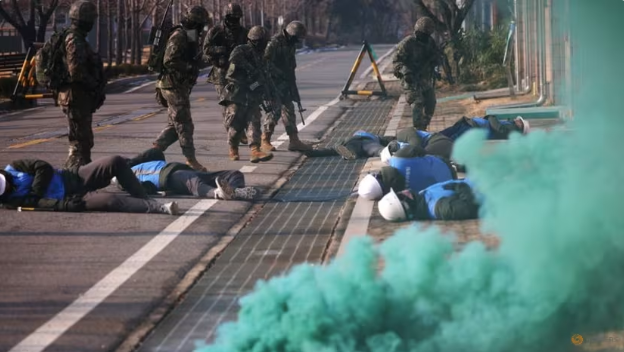SEOUL: More than 1,000 South Korean military, police and emergency workers joined rare defence drills on Wednesday (Dec 27) that simulated an attack by North Korea on Seoul, to counter fears the city is in striking distance of Pyongyang’s weapons and covert attack.
The exercise comes amid heightened tension after the North tested an intercontinental ballistic missile and launched its first military spy satellite, with the neighbours reinstating last month some security measures eased after a 2018 pact.
“There was a big lesson for us when Israel’s world-class advanced defence system helplessly buckled under a surprise attack by Hamas armed with conventional artillery and primitive means,” said Oh Se-hoon, the capital’s mayor.
He said the militant group’s cross-border rampage on Oct 7 through towns in Israel, which killed more than 1,200 people at the time, showed that superior military powers did not mean much if the enemy mounted a successful surprise attack.
Wednesday’s drills simulated attacks on a major water supply plant, telephone network stations, and an underground communications and power cable corridor.
Seoul’s distance of just 38km from the military line with the North makes it particularly susceptible to an attack at any time, Oh added.



Oh has taken a hardline stance against North Korea, arguing that the South must possess its own nuclear weapons as the only way to neutralise the threat from Pyongyang.
However, South Korean President Yoon Suk Yeol has ruled out owning nuclear weapons, making it a priority instead to strengthen a military alliance with the United States and restore security ties with Japan.
The drills came on a day that South Korea placed new sanctions on eight North Koreans linked to nuclear and missile programmes.
The neighbours have fought at sea and one of the South’s islands was bombed by the North, killing scores on both sides, but there has been no direct attack on Seoul since the end of the Korean War in 1953.
This month’s test of the North’s latest ballistic missile followed November’s successful launch of its first military spy satellite, while a constitutional change in September enshrined the use of nuclear weapons as a national defence policy.
